Chris Baty's Blog, page 166
April 24, 2015
Camp Pep: Writers Don’t Flinch

Are you tackling a writing project this April at Camp NaNoWriMo? Today, Grant Faulkner, NaNoWriMo’s big boss, encourages you to embrace your inner resolve:
I was reminded this past week of the two opposing sides of motivation. There are the encouragers, those oh-so-sweet folks whose words are laced with honey. And then there are the whip crackers, who, well, crack whips. Hard.
I prefer encouragement, just as I prefer donuts for breakfast, weeklong festivals for my birthday, and blue ribbons just for participating, but this week I realized the value of a good whip cracker’s unflinching attitude.
I returned home to be with my mother because she’d just had hip replacement surgery. It’s a painful thing, and my mother was most comfortable sitting in a very plump recliner. The slightest movement could cause a pang of pain.
Fortunately, she had a demanding physical therapist, Hattie, who reminded me of a terrier: jauntily playful at times, but tenaciously fierce when the situation demanded it.
Hattie walked my mother around the hallways of the care facility, and every time my mother said the pain was too much, Hattie’s eyes flared.
“Why did you get this surgery?” she asked.
“To be mobile again,” my mother responded.
“You can only get mobile by moving,” Hattie barked.
I watched as my mother’s stride lengthened. I watched as she gained confidence and momentum. I watched as she started to believe that she would indeed get better. One step at a time.
That’s where some of us are now in Camp. I’m behind my word-count goal, and I’m feeling torques of discomfort at the thought of getting up from my proverbial recliner. All of the sugar of encouragement isn’t working because I’m just too comfortable where I am (and I don’t even have pain medication). I’ve decided to channel Hattie.
“Why did you sign up for Camp?” my Hattie says.
“To finish my 2013 NaNo novel, my favorite NaNo novel.”
“You can’t type that novel with your fingers on a remote control,” Hattie says.
She’s right. Let’s get up and start writing—to gain confidence and momentum, to find the belief that we can finish our writing projects. One sentence at a time.

Grant Faulkner likes big stories and small stories. He is the Executive Director of National Novel Writing Month and the co-founder of the lit journal 100 Word Story. He’s recently published a collection of stories, Fissures. He lives in Berkeley with a family of writers and a dog that insists on sitting on his lap each morning when he writes. You can find him on Twitter: @grantfaulkner.
Top photo by Flickr user kejoli.
April 22, 2015
"You may have started with a clear idea of what your project was going to be. You may have had no..."
Write down three things—ideas, characters, themes, scenes, anything—that you now feel must be in your story, that are at the very heart of the tale you want to tell. As you keep going, keep this list in mind to help you “say what you mean and mean what you say.””
-
Olugbemisola Rhuday-Perkovich is the author of 8th Grade Superzero, and the forthcoming Two Naomis with Audrey Vernick. She loves working with schools, libraries, and community organizations as a teaching artist and lifelong learner.
Writer’s Care Packages from Camp NaNoWriMo and We Need Diverse Books.
The Stages of Writing: A Story in Gifs

This Monday, we asked you to tell us how your writing projects were going on a scale from 1-10, and promised suitable GIFs.
We have delivered:
0-2: When there’s nothing on the page, and you want to give up:
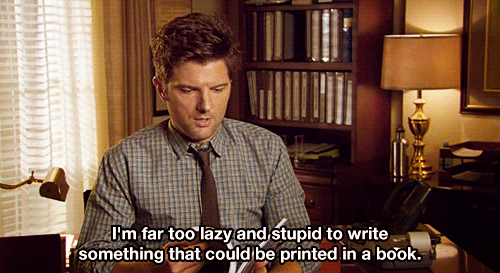 When we know you can still create a something from what feels like nothing:
When we know you can still create a something from what feels like nothing: 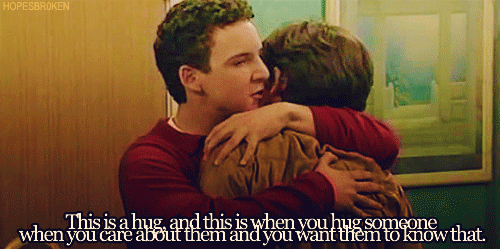

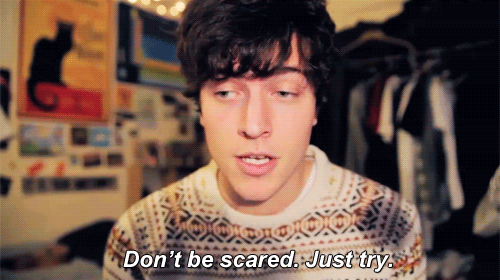 3-4: When you’re not sure if you should keep writing or not:
3-4: When you’re not sure if you should keep writing or not:




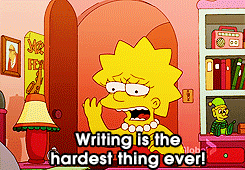 When we know this is the time to deliver a kick in the pants and some tough love:
When we know this is the time to deliver a kick in the pants and some tough love: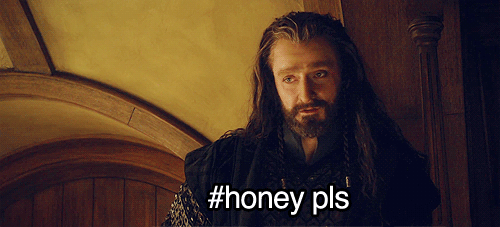


 5-6: When you’re stuck at a tough bit of your writing project, and can’t quite dig yourself out:
5-6: When you’re stuck at a tough bit of your writing project, and can’t quite dig yourself out: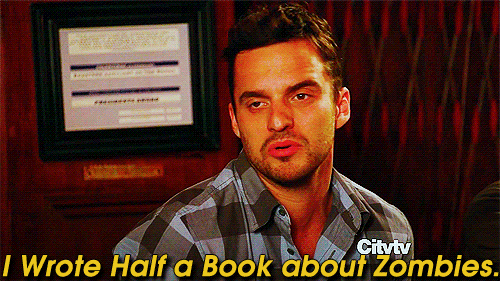 When we know you just have to start plowing ahead because you won’t regret having written:
When we know you just have to start plowing ahead because you won’t regret having written: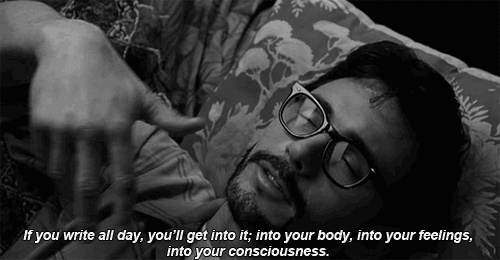
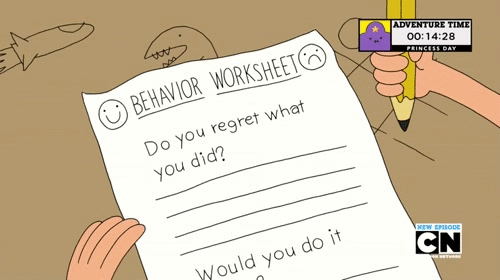 7-8: When the words are flowing, you’re happy with your draft, and/or you’re so close to the end you can taste it:
7-8: When the words are flowing, you’re happy with your draft, and/or you’re so close to the end you can taste it:
 When we are hopping, we’re so excited for you to reach the end:
When we are hopping, we’re so excited for you to reach the end:

 9-10: When you have a completed writing project basically in the bag:
9-10: When you have a completed writing project basically in the bag:
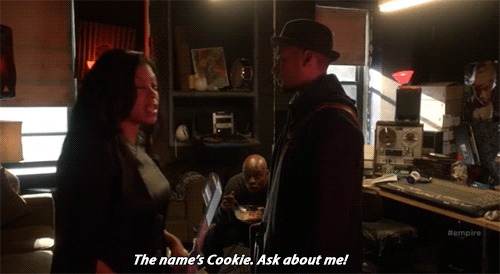

 When we know you’re on the job:
When we know you’re on the job:
 You can do this! Writers, out!
You can do this! Writers, out!
"Process matters to a writer. Make yourself a “cheat sheet” to use as you continue to..."
What worked—was there a particular routine, revision technique, or daily snack? What were some of your biggest challenges? If you were to pick a theme song, what would it be? Was there a particular critique partner or mentor who really “got” your work?
Make a list and hang it on your wall!”
-
Olugbemisola Rhuday-Perkovich is the author of 8th Grade Superzero, and the forthcoming Two Naomis with Audrey Vernick. She loves working with schools, libraries, and community organizations as a teaching artist and lifelong learner.
Writer’s Care Packages from Camp NaNoWriMo and We Need Diverse Books.
April 20, 2015
"Are things not going quite as planned with your writing project? Join the club! Welcome! It’s..."
It’s very easy to be hard on ourselves, to wouldashouldacoulda all of our energy away. Be kind to yourself. Life happens. Then, jot down a few quick goals for the rest of your time ahead.
Is there a chapter you really want to finish? A scene you need to outline? A character you need to develop? Make a few notes in the margins, drink some water, and get ready for that last stretch to the finish line.”
-
Olugbemisola Rhuday-Perkovich is the author of 8th Grade Superzero, and the forthcoming Two Naomis with Audrey Vernick. She loves working with schools, libraries, and community organizations as a teaching artist and lifelong learner.
Writer’s Care Packages from Camp NaNoWriMo and We Need Diverse Books.
April 17, 2015
Camp Pep: The Cycle of Vulnerability

Are you tackling a writing project this April at Camp NaNoWriMo? Our incredible participants have words of wisdom to share with their fellow writers. Today, Emily shares what the Peace Corps taught her about writing:
As a Peace Corps volunteer in West Africa, I’d like to think that I’ve learned a thing or two about both rustic living and resilience; two topics that are central to the Camp NaNoWriMo experience.
At Peace Corps training, our teachers talked a lot about the Cycle of Vulnerability and Adjustment: a tortured sinusoidal wave designed to describe the process of getting used to an entirely new culture.
Basically, sometimes you feel awesome, and sometimes everything sucks.
Now, I’m the kind of person whose skepticism takes on a life of its own whenever she encounters anything systematic that purports to accurately reflect the inner lives of a large, diverse group of people. The Cycle of Vulnerability and Adjustment in particular seemed almost offensively simplistic. How could it possibly be accurate? And if it was, didn’t that make people’s feelings seem mechanical and predictable—almost invalid?
After moving to my village, however, I began to understand what the Cycle was really meant to teach us. It’s not that every single person has the same experience, although it’s true that there are specific times during Peace Corps service, as during Camp NaNoWriMo, when most people can be expected to feel a bit downtrodden (Week Three, anyone?). But the more important lesson of the Cycle—easy to hear but harder to make yourself believe—is that everyone has their ups and downs and that’s normal.
What the Peace Corps and Camp NaNo have both taught me time and again is that, just as surely as bad times come, good times follow. You might not experience a perfect moment of clarity where you know exactly what a trial is supposed to teach you, but I know for a certainty that you can move past whatever’s bothering you right now. Your main character’s obnoxious, but not in the way you intended? Your writing sounds unbearably awkward? You’re woefully behind schedule? The solutions to all those problems, and pretty much any Camp NaNo problem, are the same: keep on writing, keep on writing, and keep on writing.
Keep on writing until the problem’s solved or you forget about it—you’ve got all of May to fix anything that’s still bugging you.
I’ll see you at the finish line.

emilybrehob is a community health educator with the Peace Corps in the Northwest region of Cameroon. When she’s not brushing up on her Pidgin and Meta or working hard to eradicate malaria, she enjoys reading, knitting, exercising, and participating in luxurious virtual writers’ retreats. You can find her on Twitter: @EmilyBrehob.
Top photo by Flickr user Maja_Larsson.
April 16, 2015
"Only you can write your story. Think about what makes your story uniquely you. Is it the way you..."
Once you’ve figured out the truth at the heart of your story, you have gold. And I for one can’t wait to find that treasure on the shelves one day.”
-
Marieke Nijkamp is a storyteller, dreamer, globe-trotter, geek. This Is Where It Ends, her debut YA, will be released by Sourcebooks Fire. She wants to grow up to be a time traveler.
Writer’s Care Packages from Camp NaNoWriMo and We Need Diverse Books.
April 15, 2015
"Pick up a notebook and a pen. It’s not the easiest way to track words written, but longhand is a..."
Don’t think. Don’t worry. Just write and let your pen dance across those pages. Writing longhand helps you be more creative; who knows what solutions and surprises lie lurking under the surface of your story!”
-
Marieke Nijkamp is a storyteller, dreamer, globe-trotter, geek. This Is Where It Ends, her debut YA, will be released by Sourcebooks Fire. She wants to grow up to be a time traveler.
Writer’s Care Packages from Camp NaNoWriMo and We Need Diverse Books.
April 14, 2015
"Are you feeling stuck today? Take the last scene you wrote.
What if the main character makes a..."
What if the main character makes a different choice? What if one of the secondary characters does the complete opposite of what they’re doing now? What if they push back instead of agree with your main character? What if they agree instead of push back?
The best solutions are not always the most obvious ones, so challenge yourself to do something different from what you’d normally do. Sometimes it’s all a matter of perspective.”
-
Marieke Nijkamp is a storyteller, dreamer, globe-trotter, geek. This Is Where It Ends, her debut YA, will be released by Sourcebooks Fire. She wants to grow up to be a time traveler.
Writer’s Care Packages from Camp NaNoWriMo and We Need Diverse Books.
April 13, 2015
"Remember what you love about your story. Is it the premise? The characters? (Do you ship them too?)..."
Picture yourself writing those moments. Make a list of them, and save them as a reward for finishing the chapter you’re struggling with, for every bit of progress. One word at a time.”
-
Marieke Nijkamp is a storyteller, dreamer, globe-trotter, geek. This Is Where It Ends, her debut YA, will be released by Sourcebooks Fire. She wants to grow up to be a time traveler.
Writer’s Care Packages from Camp NaNoWriMo and We Need Diverse Books.
Chris Baty's Blog
- Chris Baty's profile
- 63 followers



